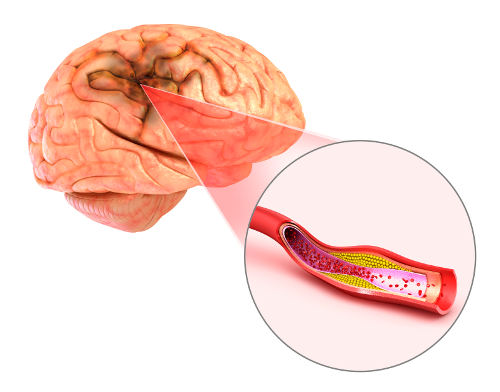 Blood clots in the brain are no laughing matter. If left untreated, blood clots can cause a lot of damage and death. That being said, the best way to deal with a blood clot in the brain is recognizing it early and dealing with it as soon as possible.
Blood clots in the brain are no laughing matter. If left untreated, blood clots can cause a lot of damage and death. That being said, the best way to deal with a blood clot in the brain is recognizing it early and dealing with it as soon as possible.
In this article, we shall examine what causes blood clots in brain, blood clot in the brain symptoms, and if there are any ways to deal with blood clots in the brain naturally. Hopefully, you will never have to deal with a blood clot in your brain, but if you do, maybe this article will give you a head start on recognizing it and dealing with it.
Blood Clots in Brain Causes
Blood clots are the body’s natural defense to damage when a blood vessel is damaged. They basically form to stop the body from bleeding out. Unfortunately, they can also form when the body thinks that a blood cell has been damaged, or if the blood cell has been damaged internally—and that’s where the problems can arise.
One of the first things to know when dealing with blood clots, is the various blood clot in brain causes. There are a number of causes of blood clots in the brain—some of which can be prevented, and other causes you can have very little control over.
1. Brain injury
A blood clot can be formed when a brain injury occurs and causes bleeding within the brain. This can also be problematic because the brain injury can have other issues that may mask the blood clot or make it harder to deal with.
2. Heart condition
A number of heart conditions can leave a person predisposed for blood clots in the brain. For example, people with atrial fibrillation or heart arrhythmia are often prescribed anti-blood clot medication. As well, if you have a blood clot that causes a heart attack, there is a chance that clot will get bumped from the heart and move up to the brain after a heart attack.
3. Atherosclerosis
This is a condition where plaque and fat have built up along the walls of the arteries. This can lead to the narrowing of the arteries and blood flow, which can lead to blood clots.
There are a several things that can make the body more susceptible to blood clots. Smoking, heavy drinking, and obesity can leave a person very open to blood clots in the brain, which can cause a stroke. High blood pressure and high blood pressure caused by diabetes may also predispose you for a stroke.
Now that you know some of the causes of a blood clot in the brain, the next step is to recognize it before it’s too late.
Blood Clot in Brain Symptoms
Blood clots in the brain are serious business, and the quicker you discover if you have one, the quicker you can attempt treatments for it. Some of these symptoms may seem a bit mundane, but if you start to see a few of them around the same period, they may turn out to be an important sign. Blood clots in the brain may include the following symptoms
1. Reoccurring headaches
An early warning sign can be multiple headaches that occur for no apparent reason. These headaches can often be localized to one particular side of the head.
2. Speech issues
Due to the clot interrupting blood flow in the brain, it can cause speech issues with common affectations like slurring and stuttering.
 3. Blurred vision
3. Blurred vision
A sudden blurriness of vision is a common symptom of a blood clot in the brain. Double vision and loss of vision in one or both eyes are also not uncommon.
4. Seizures
One of the worst symptoms is seizures. They can be caused by a blood clot with no warning, and usually become somewhat reoccurring.
5. Loss of motor skills
Due to its interference with the brain, a blood clot may also cause a loss of motor skills, balance, and coordination.
Blood Clot in Brain Treatment
If a blood clot has been identified, the next obvious step is to treat it. Luckily, there are a few different treatments for a blood clot in the brain.
1. Anticoagulant drugs
These blood-thinning drugs can not only break up an existing blood clot, but can also help prevent them from occurring.
2. Tissue plasminogen activator
This drug, also referred to as TPA, was first used with heart attack victims. But nowadays, it is also used to help break down blood clots.
3. Surgery
There are a few surgical options as well. Most involve going through a vein to reach and remove, or dismantle the clot. In rare occurrences, the skull may be opened in order to get at it.
In addition to the medical procedures, there are a few ways you can help with a blood clot naturally.
How to Remove Blood Clot in Brain Naturally
The first thing you must know is at this time, is that there is no way to treat a brain blood clot naturally. If you find any advice on how to remove a blood clot in the brain naturally, it is untrue. For the sake of your own health, disregard it. If you are suffering from any brain blood clot symptoms, please seek medical help and talk to your doctor.
That being said, there are a few natural ways that can help prevent a blood clot from forming.
1. Avoid prolonged sitting
Depending on your job, this may be easier said than done. Blood clots can be formed in your legs from long periods of sitting. Those clots can travel from your legs to the lungs, heart, and brain. If you are supposed to sit for long periods of time, try to break it up a little by getting up and walking a little bit every two hours.
2. Live healthy
Again, this might be easier said than done, but the easiest way to avoid blood clots is to live a healthy lifestyle. Keep your weight down, keep your cholesterol low, and get regular exercise. All of these things can help reduce the risk of blood clots.
Blood Clots Are No Joke
As you can see from above, blood clots are no joke and should be taken seriously. If you are suffering from any of the symptoms for an extended period of time, make sure to see a doctor and get yourself checked out. The sooner you get it diagnosed, the quicker they can get it worked on. In the meantime, the tips for naturally preventing a blood clot are there. They will not only help with blood clots, but they are pretty good health tips in general.
Related:
- Recognizing the Symptoms of a Brain Aneurysm
- What Causes Brain Fog?
- Creatine Monohydrate: Could It Boost Brain Health?
- Physical Activity to Help Prevent Anxiety and Keep Your Brain Healthy
Sources:
“Blood Clots in the Brain,” MD-Health; http://www.md-health.com/Blood-Clot-In-Brain.html
Black, K., “Brain Blood Clots: From Easily Treatable to Life-Threatening,” Everyday Health, January 17, 2013; http://www.everydayhealth.com/columns/keith-black-brain-health/brain-blood-clots-from-easily-treatable-to-life-threatening/
“Blood Clots in Brain,” New Health Guide; http://www.newhealthguide.org/Blood-Clot-In-Brain.html
“Blood Clots,” WebMD; http://www.webmd.com/dvt/blood-clots#1
